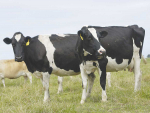“In fact, they were happy to use any type of bed with the exception of the dual chamber waterbeds,” corresponding author for the Pastoral 21-funded research programme, Jean Margerison, told Dairy News.
Margerison presented a short paper at last week’s New Zealand Society of Animal Production conference in Hamilton detailing the behaviour of three mobs of cows in the project: one at pasture 24/7, and two grazed for four hours/day, then housed in free-stall barns with access to either sand or waterbeds.
The pasture mob and the sand mob spent just over 11 hours/day lying down, but the waterbed mob reclined for just 9.6 hours/day. What’s more, that 9.6 hours/day included 1.7 hours of the 4 hours/day grazing period.
Cows in the sand mob spent less time, 1.2 hours of the four hours/day, at pasture lying down while the 24/7 pasture mob spent just 45 minutes lying down in the same period.
“Cows at pasture need to graze for longer than cows offered silage in a shed and so the housed cows can spend more time lying at pasture,” says Margerison
She says a different result might be seen if cows were fed less than the 10kgDM/cow as silage offered in the shed in the trial.
All the cows were given a three day acclimatisation period to their bedding, before a three day monitoring period.
Heeding the waterbed manufacturer’s advice that animals may take a fortnight to acclimatise to the product, some cows were kept on the beds for an extra 14 days but lie time declined even further.
“The problem with more standing and less lying down is, as other researchers have shown, reduced productivity and more animal health issues, most notably lameness.”
Margerison notes several overseas studies have found cows to be uncomfortable on waterbeds. Some of findings point to the temperature of the bed being a problem, but the Massey work was done mid summer so beds were unlikely to be too cold, or too hot, she says.
The behavioural differences observed in the Massey work couldn’t be assessed with respect to animal productivity as the cows in the trial were dry at the time. In the trial, all mobs were stood on concrete for two hours/twice a day to simulate milking during the research. Margerison notes that of all the beddings used the cows kept cleanest on sand.


















